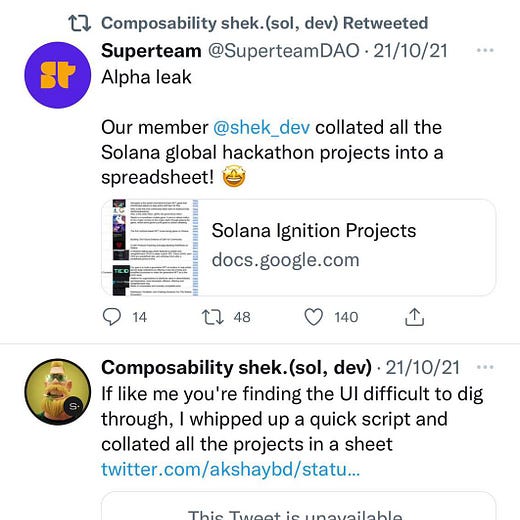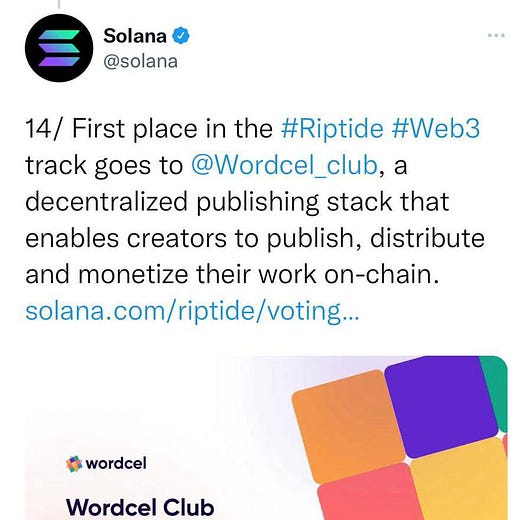An invitation to build on Wordcel
A deep-dive on why you should build on Wordcel, along with 3 fundable RFPs
Wordcel has quickly become the home for decentralised publishing on Solana. Born from within Superteam, they launched with a bang by winning the web3 track of the Riptide hackathon.
Anyone who’s built a protocol knows that you need to seed the first set of applications on it. You hope that based on the traction of these early applications, more developers come and build on top of your protocol.
The first product launched by the Wordcel team is around long-form blogging, an editor for creators to publish content & a reader. Since then they’ve onboarded ~191 authors, including many of the best projects from the Solana community.
They’ve continued to add a lot more features like the twitter bot - which allows you to import & publish your threads on wordcel. It tried it on the 38 tweet mega (by reasonable standards) thread I’d published about Superteam’s solana summer camp top picks. Worked like a charm…
And most recently, they’ve launched an improved discovery experience with their feed & search functionality. And better creator monetisation, with the option for creators to opt-in to receive USDC tips.
One of the things that stood out for me was how deliberate this team, that set out to build a protocol, has been in designing their products. Few examples,
Your drafts auto-save instantly. No puritan stance about having everything “on-chain”.
A feed appears even if you don’t connect wallet. No blank screens, ever.
Tipping is opt-in for creators, no spam or unknowing tax violations.
Starting with a fixed $1 tip to test demand, instead of feature bloat.
Great to see a protocol focused team building products so thoughtfully, with the end-consumer in mind. And their customers agree too.
We need a lot more of this to build usable web3 products and have a shot at mass adoption. However, it is always a trade-off for a small team to pick between building features that early users demand from the product & making fundamental improvements to the underlying protocol. Focus too much on the product and you’ll never achieve the underlying vision you started out with. Or focus too much on the protocol at the cost of the product, and you’ll lose the audience you’re building for. Far too many projects end up in the second category.
So far, the team has been stretching themselves thin to keep the pace at both ends. But the most desirable way to grow the wordcel ecosystem is by opening it up to the community of builders. That is, after all, the point of a protocol.
That’s why we’re excited to share that the team has recently open-sourced an SDK for building on top of the Wordcel protocol.
Through this essay we hope to inspire developers, designers and contributors to start building on top of the Wordcel protocol. You’re also welcome to apply for a Solana foundation India grant to fund your efforts.
The rest of this essay is structured as follows:
About the Wordcel Protocol
Meet the Team
Product Traction
Grant ideas you can use to start building today
Bonus Opportunity
Thanks to Shek & Paarug for inputs to this essay.
You can also read this post & follow me on Wordcel.club here.
With that, let’s dive in.
Why should you build on Wordcel ?
They’re building the Layer0 of Social Connections and Information Sharing. They store your content on decentralised storage (Arveawe + Bundlr), social graph on Solana (queried using concise labs) & use open standards of user identity (Bonfida - SNS, Cardinal labs).
This makes it possible for many social applications and businesses to be built using the Wordcel protocol. This essay on data composability outlines the underlying concept well.
Developers are assured that the set of content, creators & audience they are building for will always be accessible to them. Content creators have a programmatic guarantee that their work & audience cannot be captured by any single platform.
While the first product is focused on written content, the protocol is designed to support any media. The only constraint is that the first version is optimised for low velocity writes & fast reads. This means that you can build multimedia apps (e.g. podcasting, photo/video sharing, a meme network, etc.) on the wordcel protocol today. The team is working on a v2 which will support higher velocity writes, but that is for another post.
What’s important to note is within a short period of time the team has built a protocol that supports a consumer-grade application while also being decentralised & censorship resistant. This is a rare and commendable feat.
Most importantly - this is a great signal for builders, like yourself, to check for before deciding to build on a protocol. There is significant risk involved while making this decision, and great teams have often suffered because they picked a protocol that didn’t scale technically or otherwise.
In this case you have a team that has demonstrated both the technical & product sense needed to achieve their vision of building layer-0 of communication & information sharing.
The Team
What really stands out is that all of the current team members were onboarded to web3 & Solana independently through Superteam. They did not know each other before this. The hiring decisions were made solely on this shared identity which signals intent and demonstrated capability to work in web3.
Shek, CEO
Shek is a distributed systems engineer. His experience in building large scale infrastructure is (almost) half the age of the rest of his team members.
He stumbled onto the Solana ecosystem by hanging out in Superteam’s discord. He fell in love with the simplicity of Solana’s architecture and the supportive vibes of the Solana community. He mentors young developers at Superteam, aka “Office hours with Guru-dev”. Interestingly the initial seed for Wordcel started because Shek wanted a place to publish his architectural & technical deep-dives. Follow him on twitter.
Kunal, Dev
Kunal Bagaria is a 17 y/o full stack engineer currently working at Wordcel Club. He's created multiple innovative products in the Solana ecosystem like Wagmi.bio and StellarSOL. One of the first grant winners, he is currently the top developer in Superteam by XP.
He lives in a remote town in India called Dibrugarh around the tea estates in Assam. His story embodies Superteam’s mission - anyone, from anywhere, with a laptop & an internet connection can plug in to global earning opportunities. No resume, no credentials, no connections - just proof of work. Follow him on twitter.
Paarug, !Dev
(Ops, Partnerships, BizDev, Community, etc)
Paarug is a student, podcaster, writer, marketer and an aspiring shadowy super coder. A generalist with a multitude of interests always drawn towards innovation, new ideas and solving problems.
Another Superteam success story, he started off with an internship at TimeSwap labs and now works full time at Wordcel. He’s largely responsible for the rampage of project partnerships, witty and informative content from their twitter, a thriving community & (allegedly) the intern account. Read his full story here
Yash, Design
Yash is a college skipout & a self-taught designer. He’s freelanced for over 50+ SaaS projects & 20+ Crypto projects. He’s also grown meme pages to 10m+ followers & hobby apps to ~1m downloads. He’s quickly become the top designer in the community & is well known within the Solana ecosystem for his “Roast my dApp” working sessions at recent hacker houses. Follow him on twitter.
Ddude, Product dev
Ddude is responsible for building the first product (long-form blogging) on the wordcel protocol. He’s been an early member of Superteam and was part of many early projects like ground zero, our reputation dashboard, etc. He is also the automation wiz @ wordcel. Follow him on twitter.
Product & Traction
There are 191 unique authors currently publishing on the wordcel protocol. And around 20 of the top projects from Solana are using wordcel for their long form publishing and communications.
Projects like MarginFi, Metapass, Squads, Cypher, Snowflake, CrowdPad, Fact Protocol, Solvent, Bonfida, etc are now using wordcel as the primary means of long-form information sharing with their community.
Ideas to build
As an aside, Superteam instagrants are equity-free, designed to support builders across the Solana ecosystem. Applications take less than 15 minutes, approval decisions come within 48 hours. Anyone can apply here.
With that context, here are three ideas you should take, apply for a grant and build right away! (Note that you don’t need to restrict yourself to these ideas, feel free to apply with ideas for anything you feel can and should be built on top of Wordcel.
#1 Reader & Discovery app
In the foreseeable future, a great mobile app for content discovery will be the key driver of user growth for the wordcel protocol.
For the most part of their private beta, discovery was driven by the author’s distribution - there was no place to search for authors or scroll through feeds of posts. And while they’ve recently launched a desktop website that has a content feed & search functionality, I believe there’s a big opportunity to build a great mobile experience that caters to users irrespective of whether or not they’re onboarded to Solana.
Today, if i write on wordcel and share a link with my friends - they can’t follow me without having a Solana wallet and enough SOL to pay gas. There’s also no option to like or comment. This deprives authors of the vital feedback loop to their content. You have an opportunity to fix that, here’s the blueprint…
Functional Requirements
Build a mobile app that works on android and/or iOS. Since this is your product, you decide which market you want to target. You are free to apply for a grant to build either one or both. You can build one first and then follow up on the other platform based on traction & demand. You could also go the react-native approach to build a single app that works on both platforms. Entirely up to you.
As someone with an existing solana wallet
I should be able to connect-wallet & follow authors. You can either build a self-custodial wallet within this app or integrate with Phantom. Additional wallet support can follow once there is traction.
Existing authors I follow should automatically get sync’d
This should not require me to sign a transaction. Make this one-click seamless and find another way to monetise. Use the grant to subsidise the initial gas.
As someone new to solana/without a Solana wallet
I should be able to one-click follow any author without needing to set-up a wallet.
This can be done via a web3auth type integration which abstracts out the wallet behind an email sign up flow.
As a new user who doesn’t follow any authors,
I should see suggestions of authors I can follow in “one-click”
I should see a default feed of content, you are free to pick any sorting logic (reverse chronological, popularity, etc)
As someone who follows at least one author,
I should receive push notifications when an author I follow publishes on wordcel.
I should see a feed of content from all the authors I follow.
I should receive email notifications whenever an author I follow publishes an essay
As a user, I should be able to like & comment on their favourite posts. The choice of where to store these interactions is left entirely up to you. There is no requirement for them to be on-chain or open-source. While we believe in the power of composability & would like if these too were open for others to compose on, you are free to gate them within the platform.
Bonus features (Optional, pick any and as many as you’d like)
Allow me to connect twitter and give me a “one-click-follow” option for of my twitter friends who are authors on wordcel
If i connect a wallet, suggest authors to follow based on my on-chain activity: NFT memberships etc
Tipping: If a creator has opted-in for tipping, a user should be able to tip them in USDC from their Solana wallet. Supporting fiat or other payment methods seems premature at this point.
Token gated content : Creators should be able to make some content accessible only to members who hold a certain NFT or set of tokens. Projects like Metapass, Lit Protocol will be useful tools in achieving this.
#2 An Editor
This is where author’s will spend most of their team, crafting the essays you so love to read. The team at wordcel believes it is vital for there to be multiple options for their community of writers to choose from.
Lucky for you, I’ve been a beta user of their editor for the last couple of months & I can help you design a better one ;)
Parity Feature Requirements
Build a website or app primarily designed to be used on desktop platforms.
For existing wordcel authors
Any wordcel registered author should be able to login
All their posts, drafts, and profile (including followers etc) should be visible. It should be seamless to operate between the current editor and this new one.
Anyone should be able to request for a whitelist from a wallet that isn’t associated with an existing wordcel account.
The editor should support all other stock features from the existing editor. Including, but not limited to,
Different font sizes for headings, text, etc
Bulleted and numbered lists
Embedding images, tweets, YT links, NFTs and other media with captions
Divider lines
Quotes
Hyperlinks for both text & captions
Features that will make your editor better
Authors should only have to sign transactions ONCE, while publishing. No signing should be needed at ANY interim steps like uploading images, saving drafts, etc.
Authors should be able to import their blogs from popular publishing services like substack, medium, etc. Build on Wordcel’s import api.
Bonus Feature (Optional)
Mask the primary wallet address to support anonymous/pseudonymous publishing
Support a “pageless” mode. Many authors (including me) find the current block-style editor a little restrictive while writing.
#3 A Podcast App
The wordcel protocol is content agnostic. While the first product is around long-form blogging - it is by no means restricted to just that. To help illustrate, you’re invited to build a podcast (audio and/or video) app using the wordcel protocol.
Since this is a new app that needs to be built from scratch, we’ll keep the functionality to a bare minimum,
Editor app: Integrate with or build an editor which allows creators to record and/or upload their audio/video podcasts. Bonus points if you allow them to import existing episodes from popular platforms
Listening app: Build a mobile app that allows listeners to discover & consume podcasts.
Bonus Opportunity
SDK Documentation. The Wordcel team is looking for someone to write top-notch documentation for their open-source SDK. This is critical to ensure that community members can continue to build products on top of the Wordcel protocol.
DM Shek or Paarug if you’d like to apply for this assignment. You could earn anywhere between $250 - $2500 for it, depending on the scope of work, quality of your past writing, etc. As a young developer/technical writer - this is a great chance to get a front row seat at one of the best teams in the space, while getting paid for it.
That’s all folks,
Happy Sunday
You can also read this post & follow me on Wordcel.club here.














